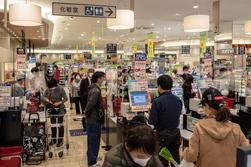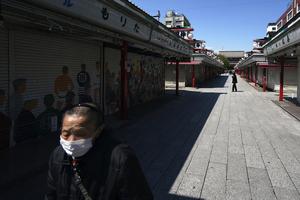 Customers wearing face masks queue at the cashier in a supermarket in Tokyo on April 23, 2020. Japan is under a month-long state of emergency to curb the spread of the COVID-19 coronavirus, initially covering seven regions but now in place nationwide. (PHILIP FONG / AFP)
Customers wearing face masks queue at the cashier in a supermarket in Tokyo on April 23, 2020. Japan is under a month-long state of emergency to curb the spread of the COVID-19 coronavirus, initially covering seven regions but now in place nationwide. (PHILIP FONG / AFP)
Japan is set to take tougher measures, including tightening traffic regulations and naming defiant business operators, to contain the spread of the coronavirus, as the country heads toward an eight-day holiday known as Golden Week.
During a video conference on Thursday, several prefectural governors had called on the central government to introduce stricter traffic regulations on national roads for the upcoming holiday, which starts on April 29, to minimize the movement of people.
In a proposal submitted to the central government, Japan's National Governors' Association called for banning the use of state-managed parking spaces from late April to early May
"We want to work with the central government to achieve a target of reducing interpersonal contact by 80 percent during the long holidays, a period of great movement of people," said Kamon Iizumi, the governor of the western prefecture of Tokushima.
READ MORE: Japan and IOC give conflicting views on fate of the Olympics
Meanwhile, in a proposal submitted to the central government, Japan's National Governors' Association called for banning the use of state-managed parking spaces from late April to early May.
By Thursday, all parts of Japan were under a state of emergency for at least a week. However, the stay-at-home request may not been enough.
Officials in the seaside city of Kamakura, near Tokyo, said they had seen a rise in the number of visitors in recent weeks, especially in the past weekend when there was bumper-to-bumper congestion on a road along its shoreline.
In urging tourists not to visit, Kamakura Mayor Takashi Matsuo told a news conference:"As a tourist spot, it breaks my heart to say this, but it's important to prevent the further spread of the virus."
On Thursday, Tokyo Governor Yuriko Koike requested residents limit the frequency of grocery shopping to every three days and refrain from travel during the holidays, as 134 new infections were reported in the capital on the same day.
In a meeting with Yasutoshi Nishimura, Japan's economy minister who is also in charge of anti-coronavirus measures, Koike suggested stronger action against defiant business operators, including revealing their names if their businesses do not stay closed.
 A woman wearing a mask to help stop the spread of the new coronavirus walks at usually crowded shopping arcade near Sensoji Temple in Tokyo Thursday, April 23, 2020. (PHOTO / AP)
A woman wearing a mask to help stop the spread of the new coronavirus walks at usually crowded shopping arcade near Sensoji Temple in Tokyo Thursday, April 23, 2020. (PHOTO / AP)
ALSO READ: Virus-spurred slowdown in Japan prices sparks deflation fears
As of Thursday, 12,286 cases were confirmed in Japan, with 308 deaths, including 63-year-old TV host and actress Kumiko Okae, who died at a Tokyo hospital on Thursday.
Separately, Tokyo's Keio University Hospital said on Thursday that roughly 6 percent of its non-coronavirus patients had tested positive.
In a related development, Japan's health ministry is reportedly preparing to conduct antibody tests later this month to help estimate the total number of infections and how much the virus has spread.
As for the Olympics, Tokyo 2020 President Yoshiro Mori said on Thursday that there was "absolutely no" chance of further postponing the Games beyond their rescheduled July 23, 2021 opening.
"Also, given the athletes and issues of the Games management, it is technically difficult to delay it by two years," Mori said.
Kyodo News contributed to this story.


